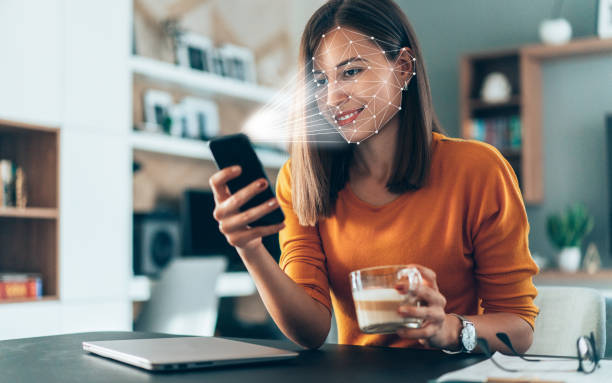Beyond simply unlocking phones or computers, biometric technologies used in face detection applications can now identify faces more correctly than humans. Facial recognition is use in a number of situations. What emerged as a feature reserved for science fiction films has now become a part of normal life? Face verification services are growing more advanced as the market grows in size. Since the emergence of coronavirus, facial recognition technology providers have added additional elements to their algorithms, like the ability to recognize faces wearing masks.
Facial recognition technology, on the other hand, has been the focus of multiple ethical issues, due to its usage for racial profiling, etc. As more firms turn to AI-powered technology, the question arises about how it benefits companies. So, let’s take a closer look at how facial recognition technology is a promising security solution in various businesses be it a bank or a healthcare platform.
1- Security Firms
The reality that machines can now effectively recognize individuals opens up a whole bunch of possibilities for the security industry, the most important of which is the capacity to detect illicit access to areas where non-authorized users shouldn’t be.
IP cameras may now be integrate with face recognition to allow sophisticate access to properties, along with the creation of different white and blacklists for particular locations, border, and asset monitoring, and risk and vulnerability detection.
While sending security professionals to tackle security invasions, security companies also commonly outfit staff with body cameras to facilitate video capturing and recording throughout critical encounters and possible altercations. This is incredibly useful if security personnel is enforcing or responding to intrusions in a region where permanent CCTV cameras might not have been present.
Indeed, many of the uses of facial recognition technology are concentrate on security advances in application to a certain company’s needs.
2- Immigration Checkpoints
Facial recognition technology can be use to identify and prevent border crossings by known criminals and individuals of interest. Today’s border checks work in conjunction with database systems like the deep learning face recognition method to accurately identify people. Processing facial data on the cloud further allows for the application of predictive analysis to the film, which can account for things like ageing, cosmetics, plastic surgery, and also the effects of narcotics, in addition to the standard quality-of-image adjustments. Also, undoubtedly document verification using AI technology is an excellent solution to identify fake documents and stop identity fraud.
3- Fleet Management Companies
Face verification solution might be use in fleet management to provide alerts to illegal people trying to get into vehicles, avoiding theft. It’s intriguing to think about how this technology could function in combination with self-driving automobiles. What if vehicles could respond to criminal attempts in order to avoid robbery of the automobile or its materials?
Face verification systems might be taught to recognize when a driver is inattentive, which is the greatest cause of the accident after drunk and speeding. It may also be trained to recognize eyes that indicate an intoxicate or weary driver, ensuring the protection of fleet vehicles.
Management can even use analytics to tell users of trends and patterns gather from diverse riders, which might serve as the foundation for a rider safety program that can be implement across fleets to improve driver safety standards.
4- Ride-Sharing Companies
Travelers in the ride-sharing company can benefit from using face detection in the same way that fleet management systems can. Face identification online adds an extra degree of validation and protection to rides in a digital economy.
Grab, a Southeast Asian ride-hailing firm that bought Uber’s Southeast Asian share and exited the market has teamed up with Microsoft to use facial recognition software to precisely determine the right drivers as well as passengers for every journey. This offers an extra layer of protection, giving commuters peace of mind in a business that isn’t traditionally regard for passenger security.
In India, Uber still functions, drivers must scan their faces on a mobile device to validate their identity as well as their driver and security credentials. This information is pass on to the travelers to provide them peace of mind that they are traveling with a genuine driver.
In the long term, cars may be equip with built-in face-scanning systems, eliminating the need for separate equipment. It can even recognize faces, unlock vehicles and allow guests to board just if they have booked the ride—providing the highest level of security possible. Users probably wouldn’t notice the security because it blends in with their daily activities.
Final Thoughts
As technology advances in a linear fashion, more industries would shift toward facial recognition technology. It will be fascinating to see how it evolves to help different industries enhance their security, whether it is e-commerce, banks, workplace, or healthcare platform.
Businesses will keep investing in these technologies to raise their security level. Besides enhancing security, facial recognition also prevent sectors from heavy non-compliance penalties. The technology is extremely user-friendly and is a great bet for all online sectors.

